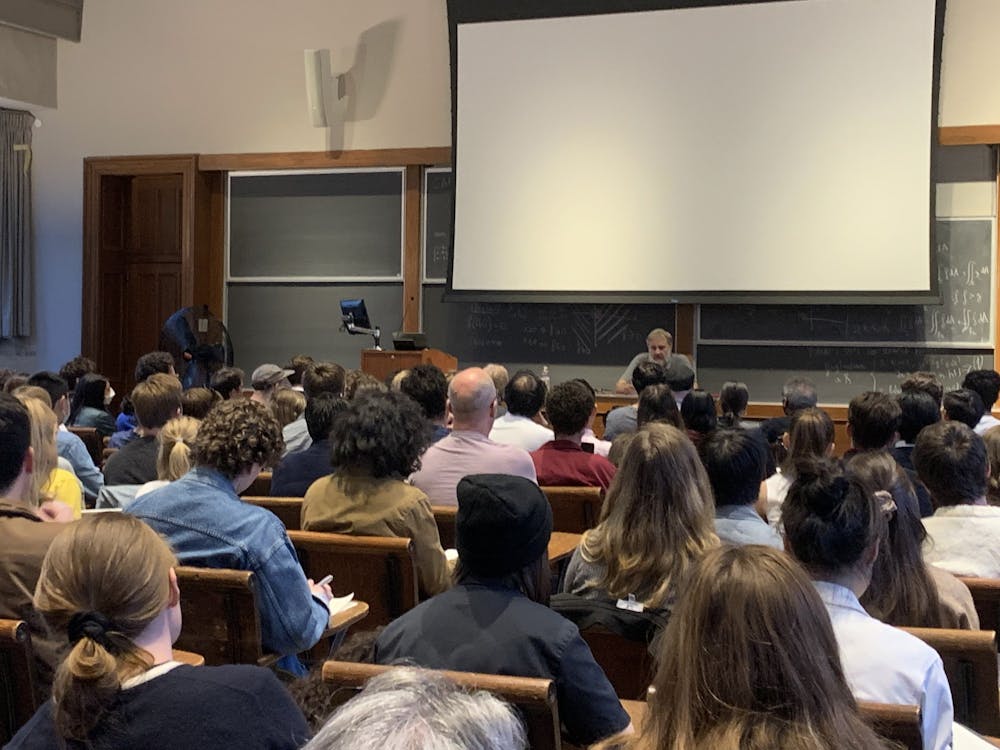Renowned Slovenian philosopher and public intellectual Slavoj Žižek visited campus early this month. His lecture attracted around 200 community members, as McCosh Hall 46 filled to capacity and attendees spilled out of the room.
“I'm particularly excited to welcome a speaker who needs little introduction. The turnout of tonight, it's kind of proof enough,” Florian Endres, a graduate student, said at the event.
Endres introduced Žižek as “a senior researcher at the Institute for Sociology and Philosophy at the University of Ljubljana, global distinguished professor of German at New York University, and international director of the Birkbeck Institute for Humanities in London.”
At the top of the lecture, Žižek discussed the relationship between gender and freedom.
“Your sexual identity is a matter of — in some deep sense — free choice, but the notion of freedom here is very radical,” he said. “It's something very traumatic, which involves a lot of physical suffering, surgery, traumas, and so on.”
“It’s not a simple freedom of choice. It's really something like an unconscious choice,” he said. “In our unconscious, we are much more free than in our conscious self-awareness. The most radical choices, we experience them as necessity.”
Žižek then pivoted the lecture towards superego, Sigmund Freud’s idea of the ethical and moral component of human personality.
“I want to begin with the paradox of superego long ago noted by Freud: the more we obey the superego commandment, the more we feel guilty,” he said. “Enjoyment is an impossible real. You cannot ever fully attain it and this failure makes us feel guilty.”

Žižek expanded on how ideological individuality prevents fruitful action, especially in relation to climate.
“What did you do today to repay your debt to nature? Did you put all the newspapers into the appropriate recycling bin?” he asked. “Following the injunctions to recycle and so on ultimately means that I follow rituals which allow me to postpone doing something that would really address the causes of ecological crisis.”
“Let me go even a step further here: The burning of the Amazon forest cannot but trigger alarm,” Žižek said. “Brazilians are, so we are told, killing the lungs of our earth. However, if we want to seriously confront threats to our environment, what we should avoid are precisely such quick extrapolations which fascinate our imagination.”
“This fascination with catastrophe which immobilizes you is one of the ways to avoid really confronting the crisis,” he continued.

Žižek said, “What all the talk about how we, humanity pose a threat to life, on and off the Earth, really amounts to, is our worry about our own fate. Earth in itself is indifferent.”
Žižek continued to talk about how humans perceive nature: “Nature is a social category. That is to say, what we perceive as nature is always overdetermined by our social contact.”
He criticized certain anthropocentric ideas. “This is the most dangerous anthropocentrism. This idea, nature itself follows some kind of a homeostatic balance, natural patterns,” he said.
“There is Mother Nature, but it's cold and cruel, to cut a long story short, but this in no way entails that we should relax and trust our future.”
Furthermore, Žižek addressed what he perceives as the dangers of modern science.
“Science and technology today is no longer aimed only at understanding and reproducing natural processes,” Žižek said. “We try to generate new forms of life that will surprise us. The goal is no longer just to dominate nature the way it is, but to generate something new, greater, stronger than ordinary nature, including ourselves.”
Žižek concluded by advocating for radical change in the market economy.
“I claim that if there will not be some kind of abolishment of the market, let's say socialization of the economy in the sense that we will have to make decisions [on] what to produce, how to coordinate, which cannot be left to the market,” he said. “If we don't take this path, then we are lost.”
In a later interview with Endres regarding Žižek’s lecture and its connection to universality, Endres said, “He talked about a universal object in a sense, or the nonexistence of it, rather.”
“Nature, what is it and how is it sort of misused in political projects, how it has certain gaps,” Endres said.
“That spoke very much to the second term in our title, which is glitches,” he continued. “It’s much more interesting when things fail because they reveal an underlying structure than going directly at the thing and describing it.”
This lecture was part of a series from the Department of Comparative Literature about “Universality and its Glitches” organized by Endres.
Endres encouraged people to continue attending the lecture series.
“I hope that people are not just interested in the big names, but also open to explore new theories [and] new people,” he said.
The lecture, titled “Unbehagen in der Natur‘: On Thinking the End of Nature,” took place on Wednesday, Nov. 2 in McCosh Hall.
Jackie Zhou is a News contributor for the ‘Prince.’ Please direct any corrections requests to corrections at dailyprincetonian.com.








